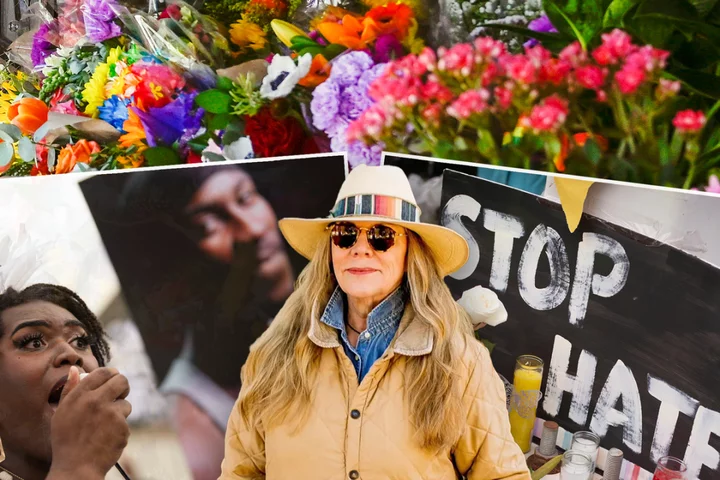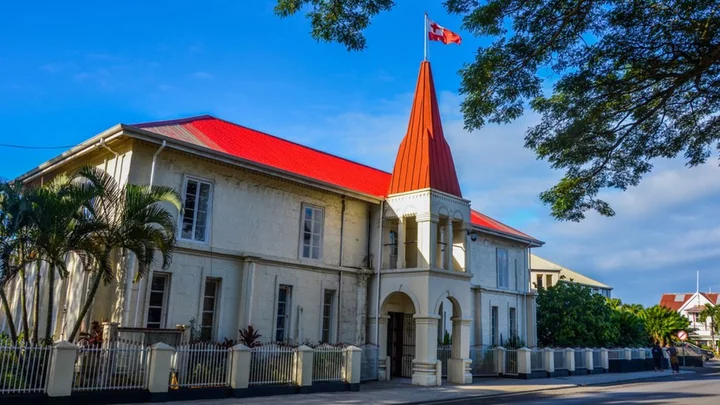
Sara Sharif: Murdered girl was being home schooled, says neighbour
"I never saw her smile or laugh," a neighbour of murdered 10-year-old Sara Sharif tells the BBC.
2023-08-23 19:59

Laura Carleton’s death and the growing ‘epidemic of hate’ against LGBT+ people in the US
A mother-of-nine who proudly displayed a Pride flag outside her California store. A gay man who danced to a Beyoncé song in Brooklyn. Five patrons killed in a mass shooting at an LGBTQ+ nightclub in Colorado. All were appalling attacks against the LGBTQ+ community and their allies in recent months. From the disruption of drag show story hours to threats against retail employees for selling Pride merchandise, the rising threat of violence is terrifying, but unfortunately unsurprising, Sarah Moore, an Anti-LGBTQ+ Extremism Analyst, told The Independent. The senseless murder of Laura “Lauri” Ann Carleton last week is the most recent example of the anti-LGBTQ+ hate currently being spread across the US. The 66-year-old store owner was a straight, white woman who spent her time helping and advocating for everyone in the community, a Lake Arrowhead LGBTQ organisation said in a post. Carleton had nine children, but because of one person’s hatred, all of them will now have to live the rest of their lives without a mother. “This epidemic of hate is not only killing us, but the people who stand with us too,” Human Rights Campaign president Kelley Robinson said in a statement to The Independent. On 18 August, 27-year-old Travis Ikeguchi, who had been spewing anti-LGBTQ+ hate on social media for quite some time, emerged from behind his computer, and fatally shot Carleton outside her Mag.Pi store on Hook Creek Road in Cedar Glen, California, according to the San Bernardino Sheriff’s Office. It was all because the fashion entrepreneur dared to hang a rainbow Pride flag outside her store. When someone would rip it down or damage it, she would simply hang up another one. But this time, Carleton was confronted about the rainbow flag by Ikeguchi as he tore it down while screaming homophobic slurs at her. He then pulled out a gun and shot her. Officers arrived to find she had suffered a single gunshot wound, before she died at the scene. Ikeguchi had fled the area, but was later tracked down by deputies. A standoff ensued and he opened fire on the officers before he was shot and killed. An investigation found a slew of anti-LGBTQ+ posts on Ikeguchi’s social media. The California man had posted images of Pride flags on fire, along with rants lashing out at the LGBTQ+ community and law enforcement. Sarah Moore, an Anti-LGBTQ+ Extremism analyst at the Anti-Defamation League (ADL), said the attack on Carleton is a “crucial example of what the ADL has been tracking in the latest trends over the past year.” “Pride flags have been targeted, whether it’s by burning them, stealing them or damaging them,” she said, adding that the flag is being used as a statement and an increasingly popular tactic against the LGBTQ+ community. Moore, who has viewed and analysed Ikeguchi’s social media, said there are not just anti-LGBTQ+ posts but also antisemitic and anti-Israel ones. “I want to stress that bias against the LGBTQ+ community often overlaps with other forms of hate,” she said. A report released in June by the ADL (the Anti-Defamation League) and the national LGBTQ+ organization GLAAD, recorded a total of 356 anti-LGBTQ+ incidents between June 2022 and April 2023, including 305 acts of harassment, 40 acts of vandalism and 11 incidents of assault. This is up from 2021-2022 where 223 incidents were recorded. The report also found that anti-LGBTQ+ incidents often overlapped with other forms of hate, with at least 128 incidents also citing antisemitic tropes and 30 incidents also citing racist tropes. Nearly half of all incidents (49 per cent) were perpetrated wholly or substantially by individuals associated with extremist groups, the report found. The most cited anti-LGBTQ+ trope was what the report called baseless “grooming” conspiracy theory, with at least 191 anti-LGBTQ+ incidents of harassment, vandalism and assault making explicit references to “grooming” or “pedophilia.” Carleton’s murder has since led to an outpouring of grief and anger from her children and family members, Hollywood stars and the LGBTQ+ community members who have warned that her killing is yet another devastating example of the increase in bigotry in violence across America. Human Rights Campaign president Kelley Robinson said in a statement that “threats against the LGBTQ+ community and our allies have evolved from violent rhetoric on social media and from anti-equality political leaders to, now, real-world violence — and let’s be honest, no city, state or person is immune from this brutality.” “The killing of Laura Ann Carleton, just for standing up for the LGBTQ+ community by displaying a Pride flag at her store, is devastating. Let’s be clear — the combination of hate and easy access to guns is killing too many of us. “From the rise of fatal violence against transgender and gender non-conforming people over the past decade, the loss of five innocent lives at Club Q in Colorado Springs, to the ruthless murder of O’Shea Sibley for vogueing at a gas station, we are seeing an escalation of hateful words turning into vicious, senseless attacks that has escalated into a nation-wide state of emergency for the LGBTQ+ community. Laura should be here with her husband and her family. This epidemic of hate is not only killing us, but the people who stand with us too.” The latest attack happened less than a month after O’Shae Sibley was murdered by a “good Christian boy” for dancing to a Beyoncé song in Brooklyn, New York. Sibley, 28, had been out celebrating a friend’s birthday when the group stopped at a Mobil gas station in Coney Island on 29 July. The professional dancer took off his shirt and was “vogueing” — a dance form popularised by the LGBTQ+ community — to Beyoncé’s Renaissance album with a friend on the station forecourt. Just after 11pm, a group of young men allegedly began hurling homophobic insults saying that they didn’t like “gay dancing” in their neighbourhood, according to eyewitnesses. Sibley confronted the men, surveillance footage showed, and the clash turned violent, ending with Sibley being stabbed in the heart during a scuffle. He died a short time later. Otis Pena, who was with Sibley when he was killed, said he and Sibley were “just pumping gas and listening to Renaissance and having a good time”. “O’Shae was just trying to tell people ‘we may be gay’ and they stabbed him right in the heart,” he continued, breaking down. “They murdered him because he was gay, because he stood up for his friends. All because he wanted people to know that we are gay.” Dmitriy Popov, 17, was later arrested and arraigned as an adult on murder and hate crime charges. He has pleaded not guilty. Eyewitnesses told the NYPD that Mr Popov had told the vogueing group that their dancing offended him as a Muslim. Mr Popov’s lawyer Mark Pollard told The Independent in an interview that his client was a “good Christian boy” who regularly attended church. “I have no idea where that came from. I just know he’s not Muslim. It’s very strange,” Mr Pollard told The Independent. Beyoncé, who was performing nearby at New York’s MetLife stadium on the night Sibley was killed, paid tribute to the dancer, choreographer and model, who family say was cut down “in his prime”. The killing attracted national attention due to its alleged homophobic nature, as attacks on the LGBTQ+ community are increasing. Last year, five people were shot dead and 17 others injured just for being at Club Q, a gay nightclub in Colorado Springs. On 19 November 2022, drag performer Del Lusional was hosting an alternative and punk show at the club — a DJ was set to follow. But then Anderson Lee Aldrich walked in and opened fire with an AR-15-style rifle killing bar staff Daniel Aston, 28, and Derrick Rump, 38, along with Kelly Loving, 40; Ashley Paugh, 35; and Raymond Green Vance, 22. Aldrich was charged with 305 criminal counts, including first-degree murder, attempted murder, assault, and at least 48 counts of committing crimes motivated by anti-LGBT+ bias. Prosecutors argued that Aldrich be charged with hate crimes, pointing out that his mother was reportedly nonbinary and forced him to go to LGBT+ clubs. Aldrich ultimately accepted a plea deal, reducing the number of charges to 53, but which included all five first-degree murder charges, 46 attempted first-degree murder charges, and two bias-driven crimes charges. Threats against the LGBTQ+ community emerged in June when Target’s Pride Month displays came under fire. Several videos posted on social media show customers destroying the displays and heavily criticising the retail company for including LGBTQ+ attire. This included a “tuck-friendly” bathing suit option and greeting cards that used inclusive language. The backlash forced the retail giant to pull some of its Pride Month merchandise after several of its employees experienced “confrontational behavior” from angry customers. “Since introducing this year’s collection, we’ve experienced threats impacting our team embers’ sense of safety and well-being while at work,” Target said in a statement. A Target spokesperson told The Wall Street Journal that several angry customers made “threatening posts on social media with video from inside stores” in addition to confronting workers. “Given these volatile circumstances, we are making adjustments to our plans, including removing items that have been at the center of the most significant confrontational behavior. Our focus now is on moving forward with our continuing commitment to the LGBTQIA+ community and standing with them as we celebrate Pride Month and throughout the year,” Target said in a statement. Target isn’t the only company grappling with public criticism. Bud Light is still dealing with fallout from its partnership with transgender influencer Dylan Mulvaney, who in April posted a picture on Instagram of a beer can with her face on it. Mulvaney, a transgender influencer, was the target of disparaging right-wing attacks for weeks after she partnered with Budweiser to promote Bud Light. In response to the hate-filled and transphobic backlash that followed, the company said it “never intended to be part of a discussion that divides people," but didn’t directly address the rhetoric or signal clear support for Mulvaney. Bud Light’s parent company, Anheuser-Busch, is tripling its US marketing spending this summer as it tries to restore lost sales. Anheuser-Busch, the producer of Budweiser beers, issued a statement at the time in response to the conservative boycott, saying that it “never intended to be part of a discussion that divides people”. “We have thousands of partners, millions of fans and a proud history supporting our communities, military, first responders, sports fans and hard-working Americans everywhere,” said CEO Brendan Whitworth. “We never intended to be part of a discussion that divides people. We are in the business of bringing people together over a beer.” In response to the increasing attacks on the LGBTQ+ community and allies, many have called for a change. Wendy Via, co-founder of Global Project Against Hate and Extremism, said in a statement this week, that this will continue to result in violence if this rhetoric and push for irrational, hateful, and rights-restricting legislation isn’t stopped.” “From the arson of a church in Texas, to the firebombing of a coffee shop in Oklahoma, to the disruption of library story hours, the threatening of school boards, and the banning of books, to the horrific murders at Club Q in Colorado last November, the threats and the violence facing LGBTQ+ people and allies is all too real,” Wendy Via, co-founder of Global Project Against Hate and Extremism, said in a statement this week. “The man who shot and killed Laura Ann Carleton after disparaging the LGBTQ+ pride flag she proudly hung in her store window had a history of anti-LGBTQ+ posts on social media sites. Yet again, anti-LGBTQ+ hate turned to violence, and an innocent woman tragically lost her life. Now, an entire community is not only reeling from the tragic death, but LGBTQ+ people and their allies everywhere are once again reminded in the worst possible way of the very real threat of hate and violence they face every day. “The killing of Laura Ann Carleton proves anti-LGBTQ+ hate and violence are out of control in the US and around the world. Efforts to demonize, intimidate, and provoke violence against LGBTQ+ people have increased over the past year globally. It would be naive to separate these violent attacks from the anti-LGBTQ+ efforts of some politicians and far-right organizations. “As we’ve said before, the relentless dehumanization and demonization of LGBTQ+ people by far-right politicians, extremist religious leaders, and hateful ideology adherents — often spread online — will continue to result in violence if this rhetoric and push for irrational, hateful, and rights-restricting legislation isn’t stopped.” Read More A mother and businesswoman whose LGBTQ advocacy cost her her life: Who was Laura Ann Carleton? Laura Carleton shooting – latest: Travis Ikeguchi’s anti-LGBT+ online history revealed after Pride flag murder Travis Ikeguchi: What we know about the gunman who shot Laura Carleton over Pride flag
2023-08-23 19:57

Taking adult education classes may lower risk of dementia, study suggests
Taking an adult education class could help lower your risk of developing dementia, researchers have found. Middle-aged and senior citizens in adult education have a 19% reduced chance of developing the condition within five years, a new study suggests. The findings also suggest that people who took the classes kept up their fluid intelligence – the ability to reason quickly and to think abstractly – and non-verbal reasoning performance better than peers who did not. First author Dr Hikaru Takeuchi, of Tohoku University in Sendai, Japan, said: “Here we show that people who take adult education classes have a lower risk of developing dementia five years later. “Adult education is likewise associated with better preservation of non-verbal reasoning with increasing age.” Here we show that people who take adult education classes have a lower risk of developing dementia five years later Dr Hikaru Takeuchi, Tohoku University Dr Takeuchi and his co-author Dr Ryuta Kawashima, also a professor at the Institute of Development, Ageing and Cancer at the university, analysed data from 282,421 people in the UK Biobank, which holds genetic, health, and medical information from approximately half a million British volunteers, They had enrolled between 2006 and 2010, when they were between 40 and 69, and had been followed up for an average of seven years at the time of the new study. Based on their DNA, people were given an individual predictive risk score for dementia, and self-reported if they took any adult education classes, without specifying the frequency, subject, or academic level. The study looked at data from the enrolment visit and third assessment visit, between 2014 and 2018. Those enrolled in the study were given psychological and cognitive tests, for example for fluid intelligence, visuospatial memory and reaction time. According to the study published in Frontiers in Aging Neuroscience, 1.1% of people in the sample developed dementia over the course of the study. It also found that people who were taking part in adult education, at enrolment had 19% lower risk of developing dementia than participants who did not. The results were similar when people with a history of diabetes, high cholesterol, cardiovascular diseases, cancer or mental illness were excluded. The researchers suggest this means the observed lower risk was not exclusively due to people with developing dementia being prevented from following adult education by symptoms of these known conditions. Dr Kawashima said: “One possibility is that engaging in intellectual activities has positive results on the nervous system, which in turn may prevent dementia. “But ours is an observational longitudinal study, so if a direct causal relationship exists between adult education and a lower risk of dementia, it could be in either direction.” Read More Charity boss speaks out over ‘traumatic’ encounter with royal aide Ukraine war’s heaviest fight rages in east - follow live Indiyah Polack: I didn’t want to go on Love Island because of my acne Everything you need to know about the UK’s first womb transplant Why are wellbeing experts concerned about the ‘lazy girl job’ trend?
2023-08-23 17:59

Tonga media guide
An overview of the media in Tonga, including links to broadcasters and newspapers.
2023-08-23 16:59

Tonga country profile
Provides an overview of Tonga, including key dates and facts about this Pacific island nation.
2023-08-23 16:49

Fukushima disaster: What happened at the nuclear plant?
A tsunami struck the Japanese plant in 2011, leading to the worst nuclear disaster since Chernobyl.
2023-08-23 16:27

Everything you need to know about the UK’s first womb transplant
The UK’s first womb transplant means that, in future, dozens of women born without a functioning organ can carry babies of their own. – What has happened? Surgeons have performed the UK’s first womb transplant on a 34-year-old woman whose older sister donated the organ to her. In a complex procedure, the medical team removed the womb from the 40-year-old woman and implanted it directly into her sister. Both women have made a good recovery. – Have any babies been born? Not yet. Experts want to be sure the transplant is stable and the womb is functioning fully before the younger woman undergoes IVF. She has stored eight embryos and will have fertility treatment later this year in central London. The woman hopes to have more than one baby. Once she has completed her family, the womb will be removed to prevent her needing immunosuppressant drugs for the rest of her life. – Has the NHS paid for the operation? No. Each womb transplant costs around £25,000 and is fully funded by the charity Womb Transplant UK. This includes payment to the NHS for theatre time and the patient’s stay on a ward. The operations are only carried out at times when the NHS is not using the operating theatre, so they do not impact on usual NHS waiting lists. Surgeons and medical staff involved in the transplant have not been paid for the operation and have given their time freely. – Have other womb transplants been carried out around the world? More than 90 womb transplants have been carried out internationally, with most operations involving a living donor. The first successful womb transplant took place in Sweden in 2014, with the baby – Vincent – born to a 36-year-old woman who described him as “perfect”. In 2000, a transplant was performed on a 26-year-old woman in Saudi Arabia but the donor womb survived for only 99 days due to problems with its blood supply. To date, womb transplants have been carried out in more than 10 countries, including Saudi Arabia, Turkey, Sweden, the US, China, Czech Republic, Brazil, Germany, Serbia and India. – How successful is the operation? Data from the US shows that more than half of women who received a womb through a transplant in the US went on to have successful pregnancies. Between 2016 and 2021, 33 women received womb transplants in the US and, as of last summer, 19 of them (58%) had delivered a total of 21 babies. In 74% of those receiving a womb, the organ was still functioning one year after transplant and 83% of this group had live-born children. – Will there be more transplants in the UK? Yes. The second British womb transplant is scheduled to take place this autumn and experts believe a maximum of 20 to 30 per year could be carried out in the UK in the future. Transplants could help women born without a functioning womb and those who lose their organ to cancer or other conditions. Estimates suggest there are 15,000 women in the UK of childbearing age who do not have a functioning womb. – Will there be a shortage of donor wombs? Womb Transplant UK is running two programmes, one involving living donors and another with organs from people who have died. The living donor programme in the UK has so far focused on women with relatives who are willing to give their wombs. However, the team believes that in the future, the living donor programme will expand to include friends or altruistic living donors. This is currently more common in the US. The use of deceased donors is assessed by the team on a case-by-case basis. Read More Charity boss speaks out over ‘traumatic’ encounter with royal aide Ukraine war’s heaviest fight rages in east - follow live Why are wellbeing experts concerned about the ‘lazy girl job’ trend? How to check for cancer, as Morrisons puts NHS cancer advice in underwear labels Prostate screening ‘could save lives’ – the symptoms and risk factors you need to know
2023-08-23 15:52

Odey to Shutter Only Fund Run by Female Money Manager
Odey Asset Management is shutting an emerging markets fund as the firm continues to reorganize in the wake
2023-08-23 15:45

Investors Say They’ll Stick With Gold as Fed Cycle Nears End
Gold isn’t losing its allure, according to a dozen money managers who all told Bloomberg News they expect
2023-08-23 14:53

Alliance of Motion Picture and Television Producers publicly shares latest package proposed to Writers Guild of America
The Alliance of Motion Picture and Television Producers (AMPTP) shared in a news release their latest package of terms proposed to the Writers Guild of America (WGA) as part of strike negotiations.
2023-08-23 13:46

Biden’s Summit With Asian Allies Further Isolates China
President Joe Biden’s security pledges with once feuding neighbors Japan and South Korea at historic talks bolstered US
2023-08-23 11:21

How South Africa's oldest Quran was saved by Cape Town Muslims
Written by a political prisoner, it is now kept in a bullet-proof casing in a Cape Town mosque.
2023-08-23 10:46
